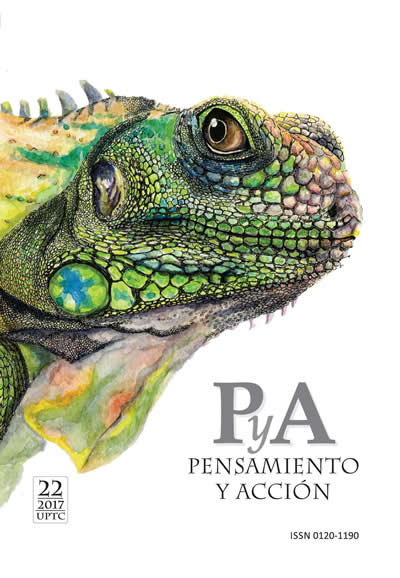Habilidades de pensamiento creativo en maestros en formación

Abstract
Education requires pedagogical transformations that allow the development of creative thinking skills in learners, from the different areas of knowledge; thus, in the teacher training process it is paramount the importance of thinking, in order to transform the realities of any pedagogical practice. This article showcases the outcomes of a research project, which explores teaching and learning strategies strengthen the creative thinking skills in fifth semesters of the Bachelor Program in Basic Primary Education of the Mariana University. This qualitative study was developed through a process of diagnosis, planning, execution and evaluation of strategies that helped to foster skills such as sensitivity to problems, fluency, flexibility, originality and layout.
Keywords
creativity, creative thinking skills, teaching and learning strategies.
References
- Abuhamdeh, S. & Csikszentmihalyi, M. (2004). The Artistic Personality: A Systems Perspective. En R.J. Sternberg, E.L. Grigorenko & J.L. Singer (eds.), Creativity: from Potential to Realization (pp. 31-42). Washington, DC: American Psychological Association.
- Adame, M. T. (2000).Orientación y psicología vocacional en España: revisión y estado de la cuestión (1970-1999). Tesis doctoral no publicada, Universitat de les Illes Balears, Islas Baleares, España.
- Canizales, A., Salazar, C. & López, A. (2004). La experimentación en la enseñanza de las ciencias naturales en el nivel primaria. Tesis de Maestría. Universidad Pedagógica Nacional. Mazatlan Sinaloa.
- Cerda, H. (2000). La evaluación como experiencia total. Bogotá: Magisterio.
- De Bono, E. (2000). El pensamiento lateral. Barcelona: Paidós.
- Esquivias, M. & Muriá, I. (2001). Una evaluación de la creatividad en la educación primaria. Revista Digital Universitaria, 1(3). Recuperado de http://www.revista. unam.mx/vol.1/num3/art1
- Goleman, D., Kaufman, P. & Ray, M. (2009). El espíritu creativo. Barcelona: Ediciones B.
- Guilford, J. P. (1967). The Nature of Human Intelligence. New York: McGraw-Hill.
- Guilford, J. (1994). Creatividad y Educación. Barcelona: Paidós.
- Kemmis, S. (1988). El currículum: más allá de la teoría de la reproducción. Madrid: Morata.
- Krathwohl, D.R. (2002). A Revision of Bloom’s Taxonomy: An Overview. Theory into Practice, 41(4), 212- 218.
- Latorre, A. (2003). La investigación acción: conocer y cambiar la práctica educativa. Barcelona: Graó.
- Maslow, A. H. (2001). La personalidad creadora. (7.ª ed.). Barcelona: Kairós.
- Moreira, M. A. (2000). Aprendizaje significativo: teoría y práctica. Madrid: Visor.
- Park, P. (1990). Qué es la investigación-acción participativa. Perspectivas teóricas y metodológicas. En M.C. Salazar (comp.) (1992). La investigación-acción participativa. Inicios y desarrollos. (pp.135-174). Colombia: Editorial Popular. OEI, Quinto Centenario.
- Peña, A., Gómez, J. & Luque, A. (2002). Aprender con mapas mentales. Madrid: Narcea.
- Perkins, D. (2003). El contenido: hacia una pedagogía de la comprensión. Barcelona: Gedisa.
- Polit, D. & Hungler, B. (2000). Diseños de muestreo. Investigación científica en ciencias de la salud (6ª Ed.). México: McGraw Hill Interamericana.
- Sánchez, E. (1990). Imaginación creativa y personalidad: estudio experimental sobre las relaciones de la creatividad y la introversión-extraversión. Revista Complutense de Educación, 1 (1), 121-135.
- Suárez, M. (2002). Algunas reflexiones sobre la investigación-acción colaboradora en la educación. Revista Electrónica de Enseñanza de las Ciencias, 1 (1). Recuperado de http://www.saumuvigo.es/reec/volumenes.htm.
- Vásquez, M. (2010). La experimentación pedagógica. Recuperado de http://cdigital.uv.mx/bitstream/123456789/2828/1/196430P203.pdf
- Viveros, M. (1997). Reflexiones sobre la creación artística. Revista Intercontinental de Psicoanálisis Contemporáneo, 66-76.